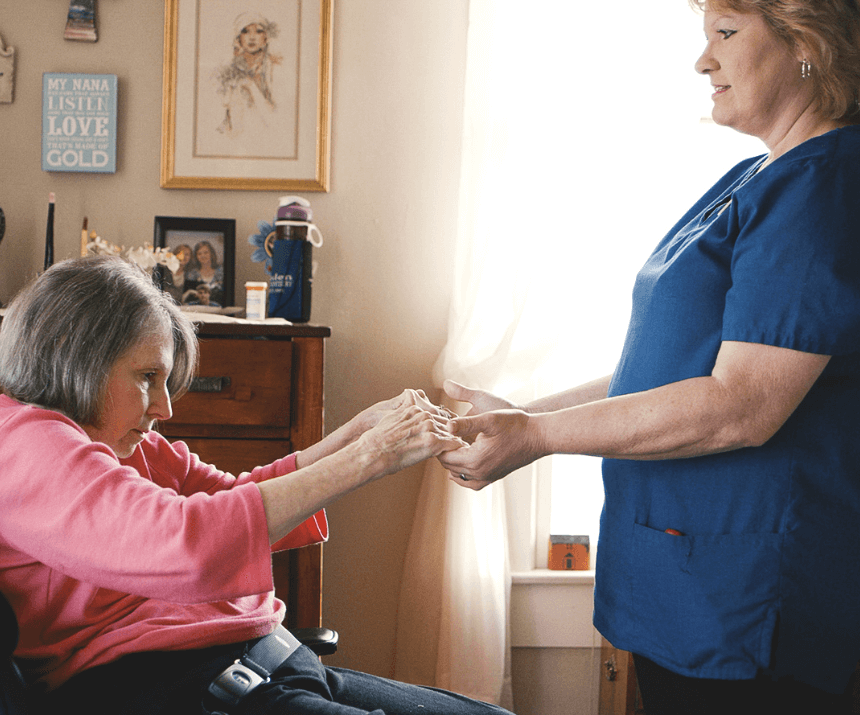Alzheimer’s and Dementia Care
Alzheimer’s and Dementia Care Services Home Health Care
The challenges of caring for a loved one who’s suffering from dementia can be overwhelming. Our professional caregivers can ease the burden with customized home health care services that ensure a higher quality of life for you, your loved one, and your entire family.
To provide the most effective method of home care services for your family’s unique situation, Home Helpers dementia caregivers receive specialized training and are highly experienced in dementia care; in fact, many are certified in Alzheimer’s care through our partnership with the National Certification Board for Alzheimer Care (NCBAC).
If you need help with a loved one with Alzheimer’s and Dementia, please call us at (561) 566-5956 and schedule your free in-home care assessment today!
Frequently Asked Questions about Alzheimer's and Dementia
What is the difference between Alzheimer's and Dementia?
Alzheimer's disease and dementia are often used interchangeably, but they are not the same. Dementia is an umbrella term that describes a set of symptoms affecting cognitive functions such as memory, thinking, and reasoning. It is a progressive condition that impairs a person's ability to perform daily activities and affects their overall functioning. Dementia is caused by various diseases and conditions, including Alzheimer's disease.
On the other hand, Alzheimer's disease is a specific type of dementia and the most common cause of dementia, accounting for 60-80% of cases. It is a degenerative brain disorder that causes a gradual decline in memory, thinking skills, and behavior. Alzheimer's disease is characterized by the accumulation of abnormal protein plaques and tangles in the brain, which lead to the destruction of brain cells and the disruption of communication between them.
While dementia is a broader term encompassing various conditions that cause cognitive impairment, Alzheimer's disease is a specific type of dementia with its own distinct set of symptoms and underlying causes.
What are the early signs and symptoms of Alzheimer's disease?
Early signs of Alzheimer's disease may include memory loss that disrupts daily life, difficulty completing familiar tasks, confusion with time or place, challenges in problem-solving, trouble with words or writing, decreased judgment, withdrawal from work or social activities, mood and personality changes, and misplacing items. It is important to note that these symptoms can also be caused by other conditions, so a proper medical evaluation is necessary for an accurate diagnosis.
Is there a cure for Alzheimer's disease?
Currently, there is no cure for Alzheimer's disease. However, there are treatments available that can help manage symptoms, slow down the progression of the disease, and improve quality of life. Medications and therapies may be prescribed to alleviate cognitive and behavioral symptoms, and lifestyle interventions such as regular physical exercise, a balanced diet, mental stimulation, and social engagement can also contribute to overall well-being. Ongoing research is being conducted to better understand the disease and develop potential treatments or preventive strategies.
How can I support someone with dementia or Alzheimer's disease?
Supporting someone with dementia or Alzheimer's disease involves understanding their unique needs and providing compassionate care. Here are a few tips:
- Establish a consistent routine and a familiar environment to minimize confusion and maximize comfort.
- Practice effective communication by using simple, clear language, maintaining eye contact, and speaking slowly and calmly.
- Engage in activities that promote mental stimulation, such as puzzles, music therapy, or reminiscing about past experiences.
- Ensure their safety by removing potential hazards, such as sharp objects or tripping hazards, and implementing safety measures, such as alarms or monitoring systems.
- Seek support from healthcare professionals, caregiver support groups, and organizations specializing in Alzheimer's and dementia care for guidance, resources, and respite care options.
Remember, providing care for someone with dementia or Alzheimer's disease can be challenging, so it's essential to also prioritize your own well-being and seek support as needed.

